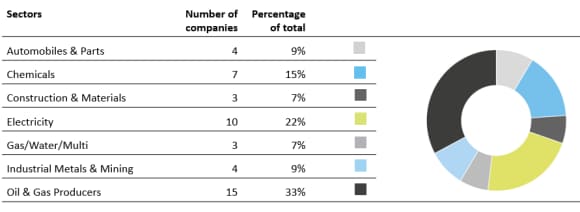Taking climate change action
We identify some of the concrete action being taken when considering our three-year engagement program on climate.
Our experience over the last three years persuades us that engagement can be a force for good and contribute to better investment decision making. This is why we have identified concrete actions to take based on the outcome of our three-year engagement program on climate.
As investors, we need to allow companies sufficient time to understand our requests and act. At the same time, we want to see tangible progress and actions on material issues after a reasonable period of dialogue.
Companies that do not make progress can potentially be excluded from future investment. As a result of our findings over the last three years, we have excluded five companies from our Sustainability-focused (active) and active and enhanced-indexing (rule-based) climate aware investment funds.
Rewarding positive dialogue
Companies that are showing good or strong progress (more than 50% of weighted engagement objectives met) could be invited to present a management resolution at the AGM to allow shareholders to vote on their climate change strategy and progress made. They might be included in case studies in our reports to the public and clients to share best practice examples. We will also likely consider them positively in future investment decisions.
Supporting accelerated climate actions
Companies showing some progress (between 37.6-50% of weighted engagement objectives met) will be encouraged to commit to more ambitious goals and practices through a private letter to the Board. Where possible we will look to provide an AGM statement from UBS Asset Management to support further action.

Raising our voice with laggards
Companies showing unsatisfactory progress (less than 37.5% of weighted engagement objectives met) will be excluded from Sustainability-focused (active) and active and enhanced-indexing (rule-based) climate aware funds in fixed income and listed equity. We will write to the Board explaining the rationale for divestment. These companies can also expect to receive a vote against the chair or other board directors nominated for election in the next AGM and may receive a shareholder resolution filed or co-filed by UBS Asset Management calling for action. We will monitor these situations on an annual basis.
The next phase of our engagement program
The next phase of our engagement program
Our efforts on climate change have only just begun. We have developed a new engagement focus list for the second phase of our climate engagement program. We have also developed new tools for financial analysts to research and engage companies on climate change risks and opportunities.
In developing our next focus list, we have decided to use the same climate aware methodology as a starting point while expanding coverage to other sectors where climate impact is material (see Table 1). We also decided to maintain high participation in CA100+ while creating a stronger linkage between companies held actively and passively, leveraging overall exposure and relationships of investment teams with corporate management. Our new list for Phase 2 comprises 46 companies, 22 of which are continued from the first phase of our program. The companies in focus now represent more total absolute emissions and are linked to higher financial exposure by UBS Asset Management (see Table 2).
Table 1: Sector distribution of the new climate engagement list
Table 1: Sector distribution of the new climate engagement list

Table 2: A comparison between the phase 1 and 2 focus lists
Sectors | Sectors | Phase 1 | Phase 1 | Phase 2 | Phase 2 |
|---|---|---|---|---|---|
Sectors | Total companies | Phase 1 | 47 | Phase 2 | 46 |
Sectors | Absolute emissions (total) mil tonnes - scope 1, 2, 3 | Phase 1 | 663 | Phase 2 | 751 |
Sectors | Mean carbon intensity ton/unit revenues | Phase 1 | 21.7 | Phase 2 | 22.2 |
Engagement checklists
Engagement checklists
Over the last 12 months, we have developed sector-specific engagement checklists for eight industries for which climate change risks and opportunities are material. These tools will allow our SI and financial analysts to assess companies’ performance on climate change and prepare relevant questions for management to address.
These lists are tailored to reflect each sector’s challenges and characteristics and provide a menu of areas to select for dialogue. The questions are mapped against specific TCFD pillars and company value drivers which can affect the investment case. We see these lists as essential integration and engagement tools.
